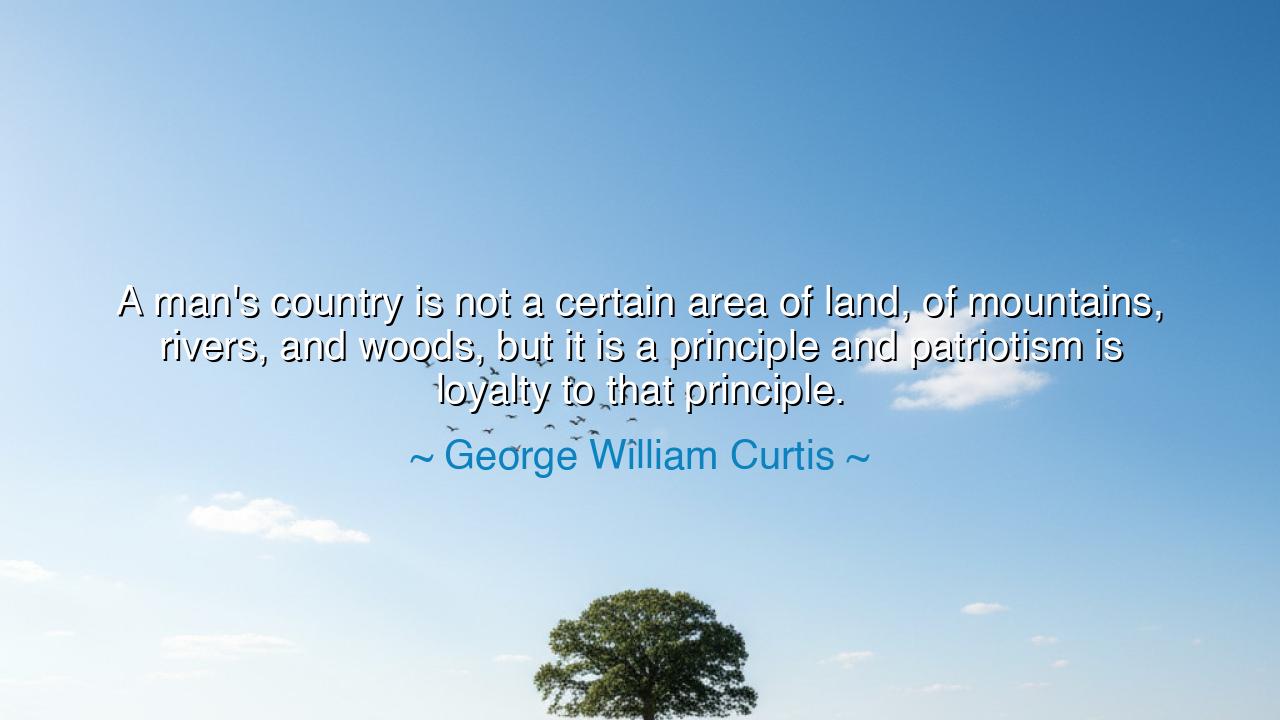
A man's country is not a certain area of land, of mountains
A man's country is not a certain area of land, of mountains, rivers, and woods, but it is a principle and patriotism is loyalty to that principle.






The words of George William Curtis—“A man’s country is not a certain area of land, of mountains, rivers, and woods, but it is a principle and patriotism is loyalty to that principle.”—sound like the thunder of eternal truth, spoken across the ages. In them we hear a reminder that patriotism is not mere attachment to soil or scenery, not merely the love of the fields where one was born or the rivers where one played as a child. It is something greater, nobler, and more enduring. A country, Curtis declares, is first and foremost an idea, a sacred principle upon which the life of a people is built.
This truth is seen in the very origins of the American Republic. The men who declared independence in 1776 did not fight for land alone. They did not bind themselves merely to rivers, forests, or mountains. They bound themselves to the principle that all men are created equal, that liberty is a right given not by kings but by nature and by God. Their patriotism was loyalty not to geography but to the great experiment of self-government. This is the patriotism Curtis speaks of, the devotion to ideals that outlive any one generation.
Consider the story of the abolitionists in the 19th century. They too loved their country, but they understood it not as loyalty to soil, but as loyalty to the principle of justice. They raised their voices against slavery, declaring that a nation built upon liberty could not survive half slave and half free. Their devotion was to the deeper meaning of America, not to its temporary institutions of injustice. In this, they showed the truth of Curtis’s words: that true patriotism is measured not by obedience to what is, but by fidelity to what ought to be.
History shows us again and again that when people confuse the land with the principle, nations falter. Empires have crumbled though their mountains still stood, their rivers still flowed, and their cities still gleamed with gold. Rome fell not because the Tiber dried up, but because the principle of civic virtue was lost. France was humbled not because the Alps vanished, but because the spirit of justice and unity fractured. The land remains, but when the principle dies, the nation dies with it.
Yet the reverse is also true: when the land is lost but the principle endures, the nation lives. The Jewish people wandered for centuries without a homeland, yet their faith and their principles preserved their identity through exile. The Poles endured partition and foreign rule, yet their devotion to liberty and culture kept their nation alive until independence was restored. Here lies Curtis’s wisdom: a country is a principle, and patriotism is loyalty to it.
The lesson for us is clear: love your land, but love more deeply the ideals upon which your nation stands. Mountains may crumble, rivers may shift, but principles endure when men and women choose to uphold them. Guard liberty, defend justice, preserve truth, for these are the essence of the homeland. To betray them is to betray your country; to serve them is to preserve it, no matter the outward trials.
In daily life, this means living as a patriot not by mere words or symbols, but by defending fairness, speaking truth, and striving for justice in every sphere. It means holding leaders accountable when they betray principle, and standing firm even when it is difficult. It means remembering that patriotism is not passive pride, but active loyalty to the eternal truths that give meaning to the flag, the anthem, and the soil itself.
Thus let Curtis’s words echo in our hearts: the country is not the land alone—it is the principle. The truest patriot is not the one who clings only to the earth, but the one who clings to the ideals that sanctify it. Let us, then, be such patriots—loyal not only to the mountains, rivers, and woods, but to the enduring truth of freedom and justice that makes the land worth loving.






AAdministratorAdministrator
Welcome, honored guests. Please leave a comment, we will respond soon